|
The Film

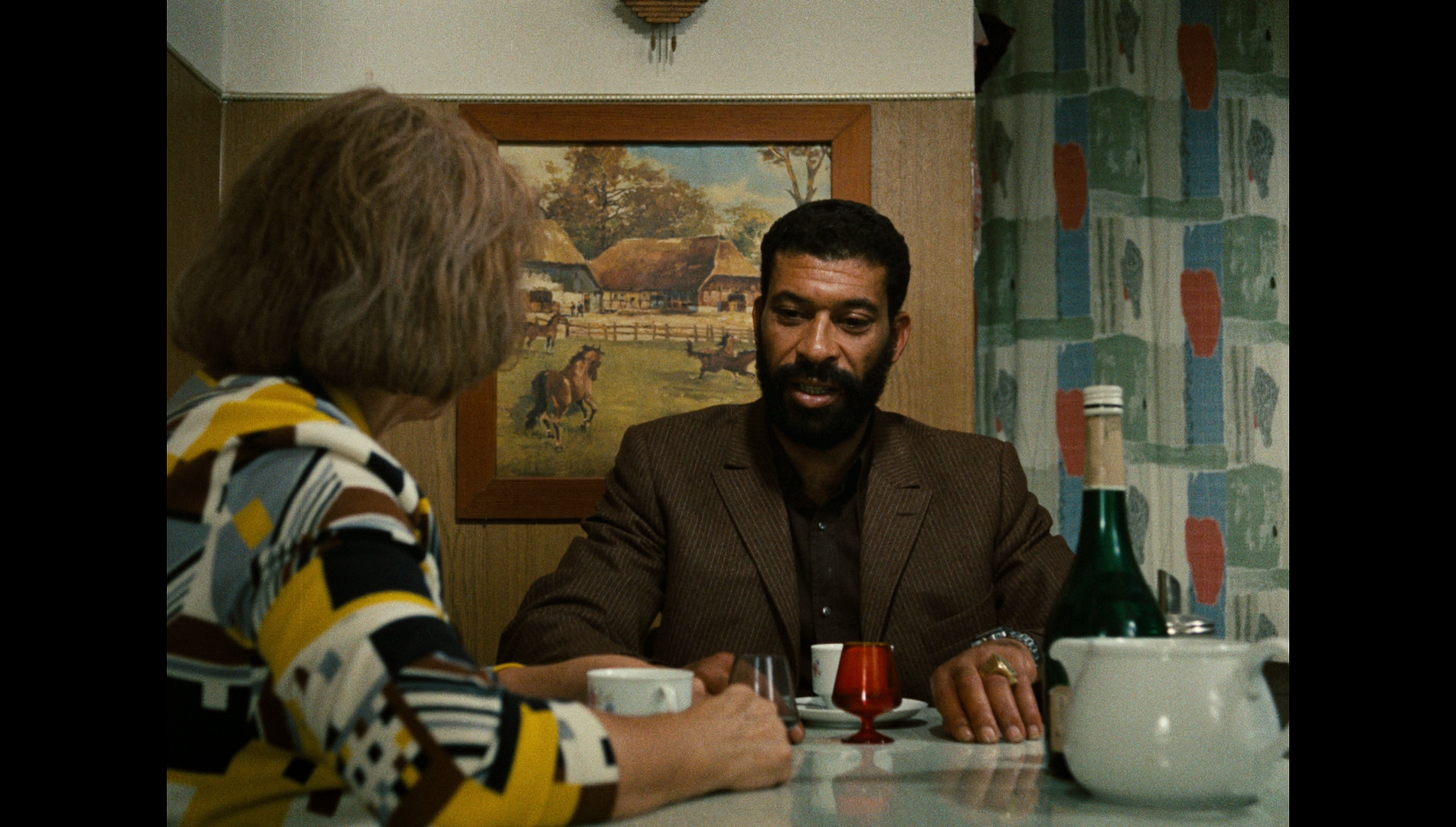 Fear Eats the Soul (Rainer Werner Fassbinder, 1974) Fear Eats the Soul (Rainer Werner Fassbinder, 1974)
Rainer Werner Fassbinder’s Fear Eats the Soul (1974) belongs to a significant body of work – both novels and films – produced during the 1950s, 1960s and 1970s that engaged with the experience of migrants and the notion of the diaspora. A key example of postcolonial literature in the English language, Sam Selvon’s 1956 novel The Lonely Londoners, for example, engaged with the experiences of migrant workers from the Caribbean in London, in a narrative told through the eyes of one such migrant, Moses. Selvon followed this novel with a sequel in 1975, Moses Ascending, in which an older and more embittered Moses operates a multi-racial hostel. The Lonely Londoners was a brusque, comic novel in which the joie-de-vivre of the migrants seemed to overcome the various prejudices they faced, the novel being characterised by a sense of warmth and community amongst the migrants themselves. By contrast, Moses Ascending is a less forgiving book that examines in a confrontational style the hostility towards migrants, and the conflicts between ‘first’ and ‘second’ generation migrant communities.
Fassbinder’s film feels very similar in tone to Moses Ascending: there are moments of hope and warmth, but these are offset by scenes in which Ali is on the receiving end of some vicious cultural cruelty. James Wicks has also compared Fear Eats the Soul with Ousmane Sembene’s 1966 picture La noire de… (Black Girl), which focuses on a young Senegalese woman who leaves her home to take a job as a governess with a French family but finds herself treated more like a servant (Wicks, 2014: 54). Both Fear Eats the Soul and Black Girl, Wicks argues, ‘include exquisite cinematic imagery juxtaposed with complex, three-dimensional protagonists who create a space for individuality and expressions of subjectivity’ (ibid.).
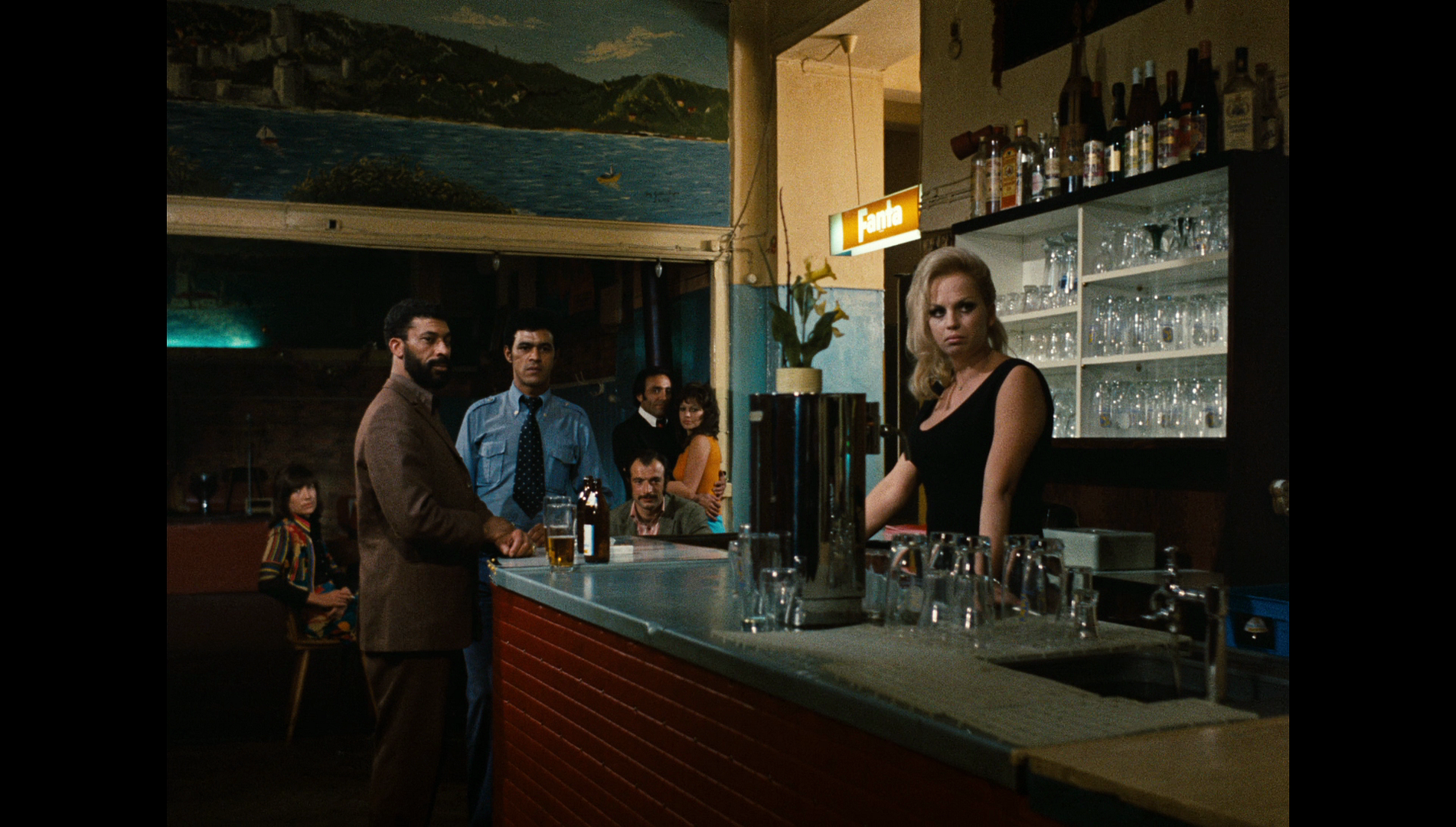 During the years of the Wirtschaftswunder (‘Economic Miracle’) of the 1950s and 1960s, migrant ‘guest’ workers (Gastarbeiter) were encouraged owing to a shortage of domestic labour. These Gastarbeiter would often be from countries such as Turkey, Morocco and Tunisia. In the late 1960s and early 1970s, there was a perception that some of these Gastarbeiter were settling in Germany beyond the agreed period (usually one or two years), leading to a spiraling sense of resentment and antagonism. Fear Eats the Soul is about Ali and Emmi’s encounters with this prejudice, rooted in the specific social context outlined above. During the years of the Wirtschaftswunder (‘Economic Miracle’) of the 1950s and 1960s, migrant ‘guest’ workers (Gastarbeiter) were encouraged owing to a shortage of domestic labour. These Gastarbeiter would often be from countries such as Turkey, Morocco and Tunisia. In the late 1960s and early 1970s, there was a perception that some of these Gastarbeiter were settling in Germany beyond the agreed period (usually one or two years), leading to a spiraling sense of resentment and antagonism. Fear Eats the Soul is about Ali and Emmi’s encounters with this prejudice, rooted in the specific social context outlined above.
Sixty-something cleaner Emmi (Brigitte Mira), a widow of twenty years, meets younger Moroccan migrant worker Ali (El Hedi ben Salem) and, discovering that he lives in an overcrowded house with other migrant workers, offers him a comfortable place to stay. Thrown together, Ali and Emmi swiftly enter into a romantic relationship and make plans to marry, much to the chagrin of Emmi’s adult children and her coworkers. Emmi’s children react angrily, threatening to disown their mother.
Attempting to escape from this hotbed of resentment and prejudice, Emmi and Ali go on holiday. Upon their return, Emmi begins to act coldly towards Ali, pushing him away. Ali recommences a sexual relationship with a barmaid that he had before meeting Emmi. However, Ali returns to Emmi, telling her ‘I don’t want any other woman’, but matters become more complicated when he collapses with a ruptured stomach ulcer.
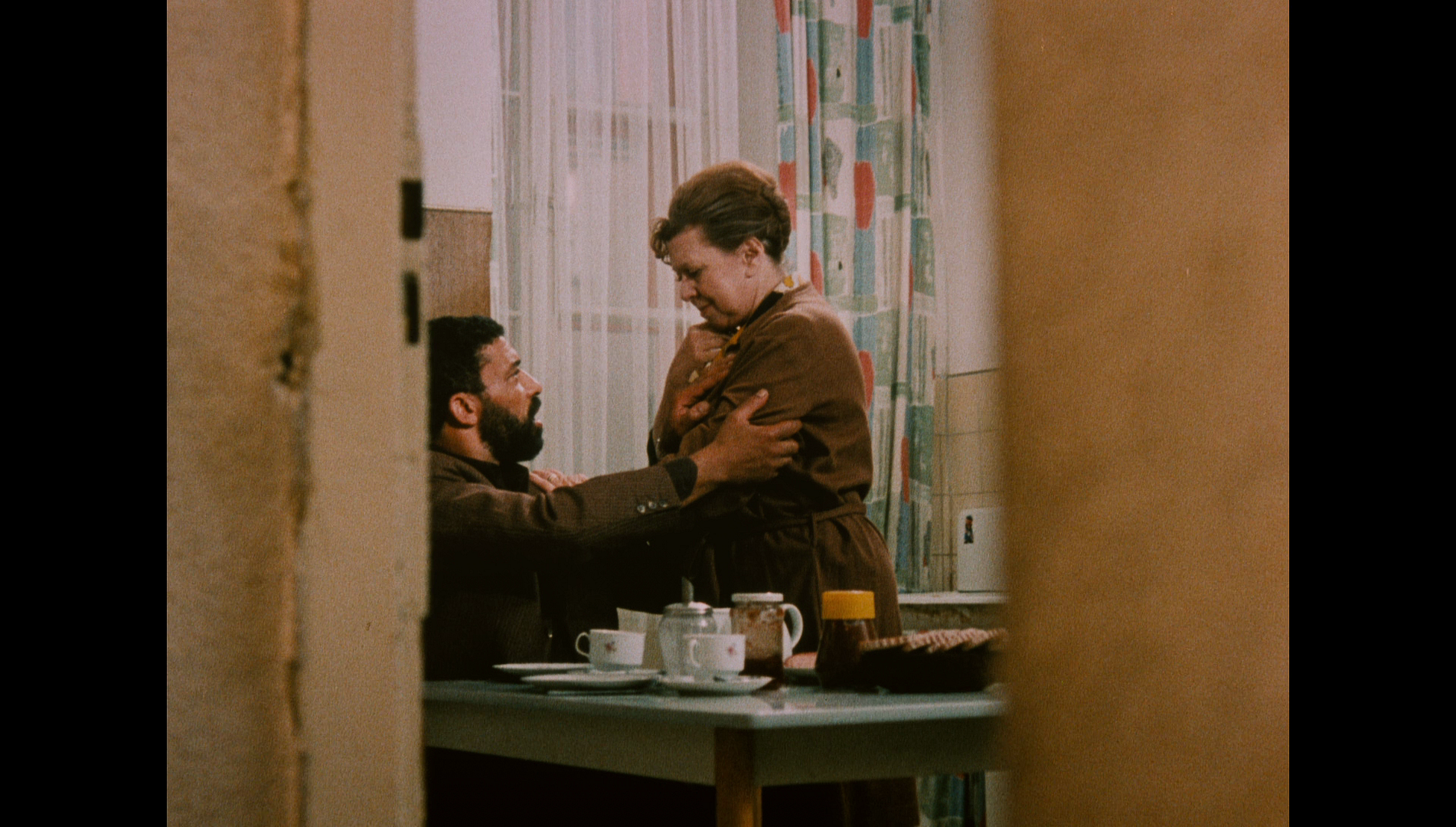 The film’s title is based on a saying of Ali’s: ‘Angst essen Seele auf’, or ‘Fear Eat Soul’. In the original German, the phrase is deliberately mangled, as are many of Ali’s lines in the film, to reinforce the fact that Ali is speaking in a language which isn’t native to himself. Throughout the film, Ali expresses himself in German which is awkwardly phrased, often referring to himself in the third person. (The English subtitles sometimes struggle to translate the nuances of this confusion of language: the film’s title is rendered in the English version into the more grammatically correct ‘Fear Eats the Soul’.) The specific phrase is introduced when, the morning after Ali and Emmi sleep together for the first time, Emmi seems visible shaken and expresses fear or worry (‘angst’) about what she and Ali have done – owing to the fact that Ali is both much younger than herself and a member of a very different culture. ‘Not fear’, Ali tells her, ‘Fear not good. Fear eat soul up’. The film’s title is based on a saying of Ali’s: ‘Angst essen Seele auf’, or ‘Fear Eat Soul’. In the original German, the phrase is deliberately mangled, as are many of Ali’s lines in the film, to reinforce the fact that Ali is speaking in a language which isn’t native to himself. Throughout the film, Ali expresses himself in German which is awkwardly phrased, often referring to himself in the third person. (The English subtitles sometimes struggle to translate the nuances of this confusion of language: the film’s title is rendered in the English version into the more grammatically correct ‘Fear Eats the Soul’.) The specific phrase is introduced when, the morning after Ali and Emmi sleep together for the first time, Emmi seems visible shaken and expresses fear or worry (‘angst’) about what she and Ali have done – owing to the fact that Ali is both much younger than herself and a member of a very different culture. ‘Not fear’, Ali tells her, ‘Fear not good. Fear eat soul up’.
The language ‘barrier’ is an aspect of the prejudice that Ali faces. Sent by Emmi to the shop of Angermeyer (Walter Sedlmayr) for a new brand of margarine called Libelle, Ali experiences hostility from Angermeyer. Ali asks repeatedly for ‘Libelle’, and the shopkeeper insists that he doesn’t know what Ali wants. Ali attempts to express himself clearly. The shopkeeper becomes frustrated and angry, telling Ali to ‘Learn German first, then come back’. Ali leaves, and the shopkeeper’s daughter descends the stairs, reminding her father that ‘Libelle’ is ‘the new [brand of] margarine’. Angermeyer reveals that he knows this very well (‘Do you think I don’t know that?’), and staged the confrontation simply to be rid of Ali. Later, an angered Emmi pays a visit to Angermeyer’s shop, telling him, ‘You understood him [Ali] all right, Mr Angermeyer. But you didn’t want to understand. And do you know why? Because he’s a foreigner’.
 Emmi’s first encounter with Ali is in a pub frequented by Ali and his ‘Arab mates’. Ali is engaged in a sexual relationship with the barmaid there, Barbara (Barbara Valentin). Emmi enters, clearly out of place. The Arabic music that has featured on the film’s audio track during the opening titles sequence is revealed to be playing on a jukebox in the pub. The exotic music has drawn the reclusive Emmi into the establishment. ‘I pass by here every evening and hear that foreign music’, Emmi tells the barmaid, ‘What language are they singing in?’ ‘That is Arabic’, the barmaid tells her; ‘We have German stuff on the jukebox […] but of course they [Ali and his friends] prefer the stuff from back home’. Emmi’s first encounter with Ali is in a pub frequented by Ali and his ‘Arab mates’. Ali is engaged in a sexual relationship with the barmaid there, Barbara (Barbara Valentin). Emmi enters, clearly out of place. The Arabic music that has featured on the film’s audio track during the opening titles sequence is revealed to be playing on a jukebox in the pub. The exotic music has drawn the reclusive Emmi into the establishment. ‘I pass by here every evening and hear that foreign music’, Emmi tells the barmaid, ‘What language are they singing in?’ ‘That is Arabic’, the barmaid tells her; ‘We have German stuff on the jukebox […] but of course they [Ali and his friends] prefer the stuff from back home’.
The gulf between German and Arab culture seems unbridgeable. During their first meeting, Ali tells Emmi that he goes to the pub because it has ‘good music, Arab mates, don’t know any other place. German with Arabs not good’. Emmi asks him why this is. ‘Don’t know’, Ali says, ‘Germans not same people as Arabs [….] German, master; Arab, dog’. Moroccan culture, Ali says, would never allow a widow like Emmi to be so isolated from others, including her adult children: ‘With us in Morocco, family always together’, he tells Emmi, ‘Mama never alone. Mama alone, not good’. ‘Other countries have other customs’, Emmi offers. Later, Ali knocks on Emmi’s bedroom door: his loneliness has, it seems, led him to internalising the prejudice against him. ‘Ali alone too’, Ali tells Emmi sadly, ‘Always working, or drinking. Nothing else. Maybe Germans right: Arabs not human’.
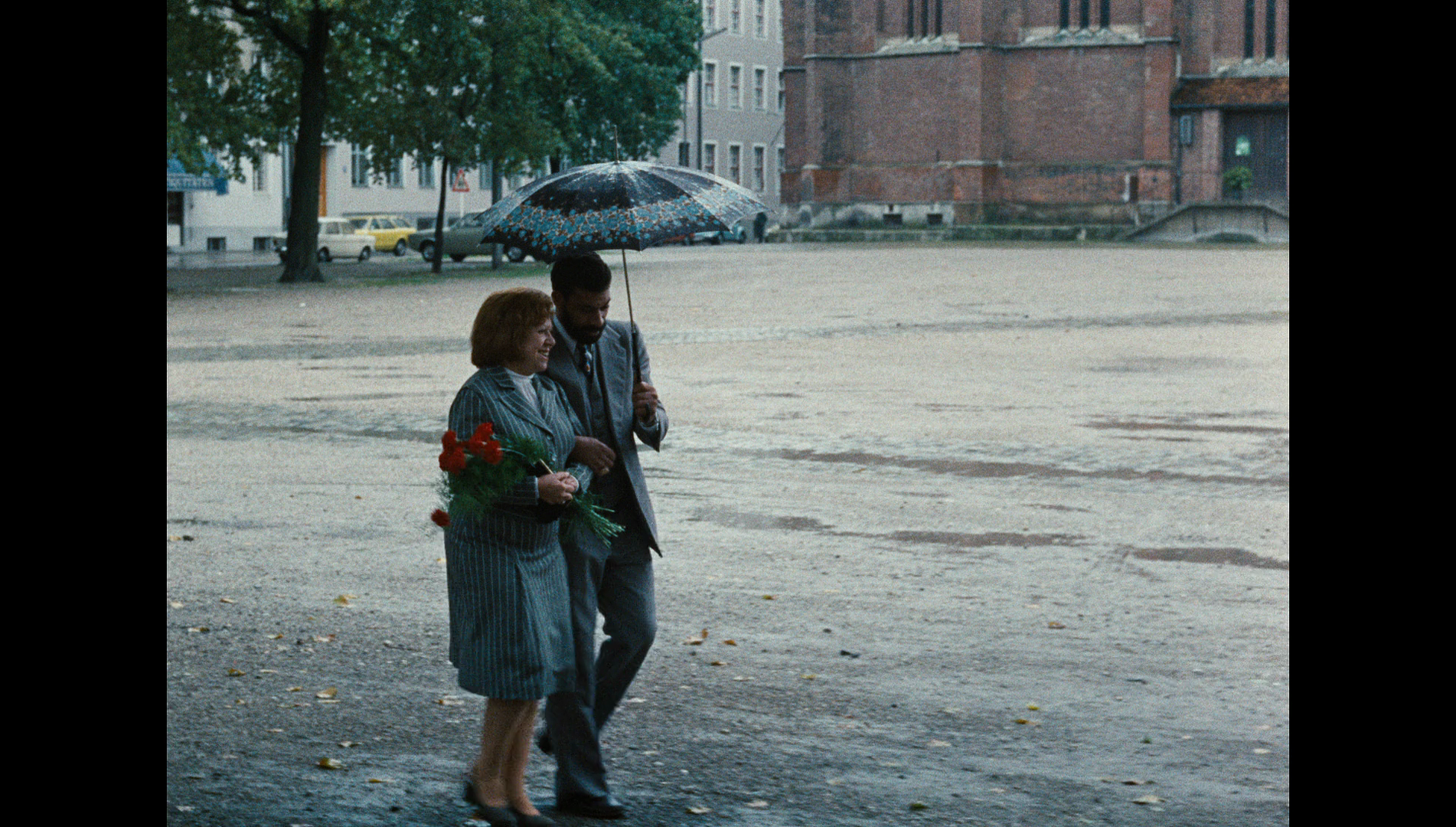 Ali suggests that the prejudice against the Gastarbeiter has escalated owing to the fallout from the events at the Olympic Games in Munich in 1972: ‘Arabs not human in Germany’, he tells Emmi, ‘Different earlier. But since catastrophe in Munich, not good’. Certainly, Emmi’s colleagues show no qualms about expressing their prejudice against the Gastarbeiter. Before revealing her relationship with Ali, Emmi tests the waters with her colleagues by telling them of a ‘friend’ who was approached by a Gasarbeiter on the way to work. ‘No, nothing’s sacred to them’, one of her colleagues says, ‘Not even old age’. The Gastarbeiter are seen as dirty and motivated by greed: ‘They’re filthy pigs’, another of Emmi’s colleagues declares, ‘Whole families crammed into one room. All they’re interested in is the money’. The Gastarbeiter are ‘Stingy, unwashed pigs. And they only have one thing in their heads: women’. The Arabs are painted by the Germans as parasitic too: though Emmi asserts that ‘They do their work. That’s what they’re here for’, another of her colleagues suggests that ‘None of them work’. To this, one of the women declares ‘They live here at our expense. You only have to read the papers: full of rapes and so on’. Those who become involved with the Gastarbeiter are tainted by their association with them: one of Emmi’s coworkers suggests that women who find themselves in relationships with Arabs are ‘filthy whores’. (Later, when she discovers that Ali and Emmi are to marry, the girl in the pub echoes this comment by calling Emmi an ‘old whore’ and telling her ‘It’ll [Emmi’s marriage to Ali] never work out. It’s unnatural’.) ‘All they want is sex’, another woman asserts, ‘Some women want it that way. They’re uncivilised’. Ali suggests that the prejudice against the Gastarbeiter has escalated owing to the fallout from the events at the Olympic Games in Munich in 1972: ‘Arabs not human in Germany’, he tells Emmi, ‘Different earlier. But since catastrophe in Munich, not good’. Certainly, Emmi’s colleagues show no qualms about expressing their prejudice against the Gastarbeiter. Before revealing her relationship with Ali, Emmi tests the waters with her colleagues by telling them of a ‘friend’ who was approached by a Gasarbeiter on the way to work. ‘No, nothing’s sacred to them’, one of her colleagues says, ‘Not even old age’. The Gastarbeiter are seen as dirty and motivated by greed: ‘They’re filthy pigs’, another of Emmi’s colleagues declares, ‘Whole families crammed into one room. All they’re interested in is the money’. The Gastarbeiter are ‘Stingy, unwashed pigs. And they only have one thing in their heads: women’. The Arabs are painted by the Germans as parasitic too: though Emmi asserts that ‘They do their work. That’s what they’re here for’, another of her colleagues suggests that ‘None of them work’. To this, one of the women declares ‘They live here at our expense. You only have to read the papers: full of rapes and so on’. Those who become involved with the Gastarbeiter are tainted by their association with them: one of Emmi’s coworkers suggests that women who find themselves in relationships with Arabs are ‘filthy whores’. (Later, when she discovers that Ali and Emmi are to marry, the girl in the pub echoes this comment by calling Emmi an ‘old whore’ and telling her ‘It’ll [Emmi’s marriage to Ali] never work out. It’s unnatural’.) ‘All they want is sex’, another woman asserts, ‘Some women want it that way. They’re uncivilised’.
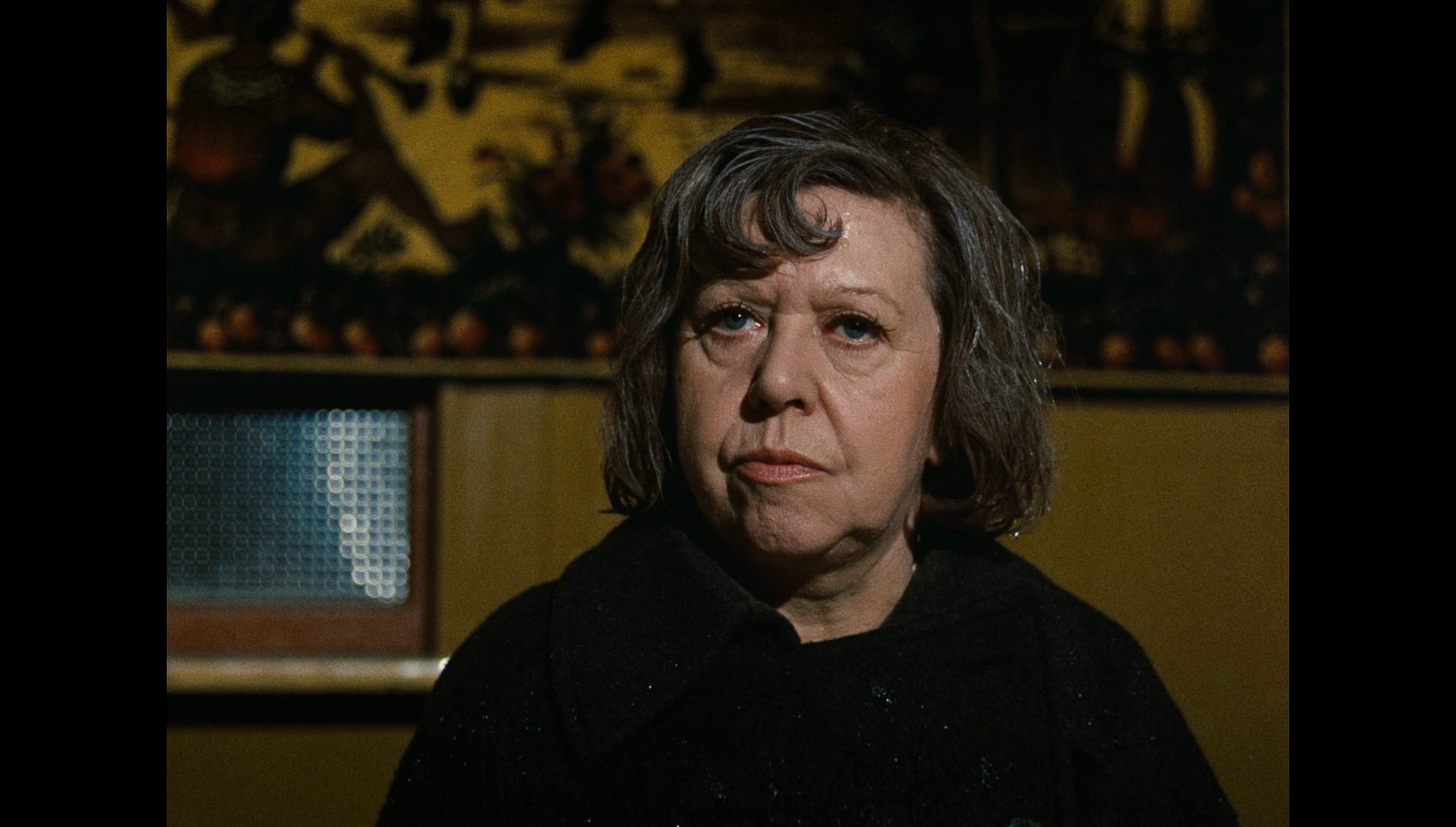 Played by Fassbinder himself, Eugen, the husband of Emmi’s daughter Krista (Irm Hermann) expresses another aspect of prejudice towards the Gastarbeiter: Eugen is filled with resentment towards the Arabs. Eugen’s workplace has been populated by Gastarbeiter, to the extent that, as Krista says, ‘He’s [Eugen has] even got a Turkish foreman. He just can’t get over it’. Emmi’s news that she is to marry Ali is met by Krista and Eugen with disbelief: initially, they believe she is joking. ‘You’ve got a strange sense of humour, mum’, Krista declares in response to Emmi’s announcement. Later, when they realist Emmi is deadly serious in her intent to marry Ali, Emmi’s children react more aggressively. Emmi’s son Albert (Karl Scheydt) kicks in Emmi’s television set before declaring ‘You shouldn’t have done that, mother. It’s a disgrace. You can forget you have children. I want nothing to do with a whore’. Played by Fassbinder himself, Eugen, the husband of Emmi’s daughter Krista (Irm Hermann) expresses another aspect of prejudice towards the Gastarbeiter: Eugen is filled with resentment towards the Arabs. Eugen’s workplace has been populated by Gastarbeiter, to the extent that, as Krista says, ‘He’s [Eugen has] even got a Turkish foreman. He just can’t get over it’. Emmi’s news that she is to marry Ali is met by Krista and Eugen with disbelief: initially, they believe she is joking. ‘You’ve got a strange sense of humour, mum’, Krista declares in response to Emmi’s announcement. Later, when they realist Emmi is deadly serious in her intent to marry Ali, Emmi’s children react more aggressively. Emmi’s son Albert (Karl Scheydt) kicks in Emmi’s television set before declaring ‘You shouldn’t have done that, mother. It’s a disgrace. You can forget you have children. I want nothing to do with a whore’.
The film is set in Munich, and a number of times the dialogue makes reference to Hitler. Emmi’s deceased first husband, Frankizek, was not German by birth: he was Polish, a fact that displeased Emmi’s parents ‘[b]ecause he was a foreigner [….] My father hated all foreigners. He was a Party member. Hitler’s Party’. Following their wedding, Emmi and Ali decide to eat at a restaurant, Osteria Italiana, which Emmi tells Ali was the site of a restaurant favoured by Hitler. Inside the restaurant, Emmi and Ali are subjected to the disapproving gaze of the waiter; as Emmi and Ali pore over the menu, Fassbinder repeatedly cuts away to the waiter staring at them, Emmi’s prior identification of the building as being the site of one of Hitler’s favourite restaurants draws the undercurrent of prejudice Emmi and Ali experience from the waiter to the foreground. Somewhere between Ali and Emmi going on holiday and their return home, Emmi seems to internalise the prejudices of others towards Ali, whilst the resentment of those around them towards Ali begins to soften. Returning home, Ali asks Emmi if she has made couscous. ‘You should get used to the way people do things in Germany, she says coldly; these words push Ali towards Barbara, who – it has been established earlier – makes excellent couscous.
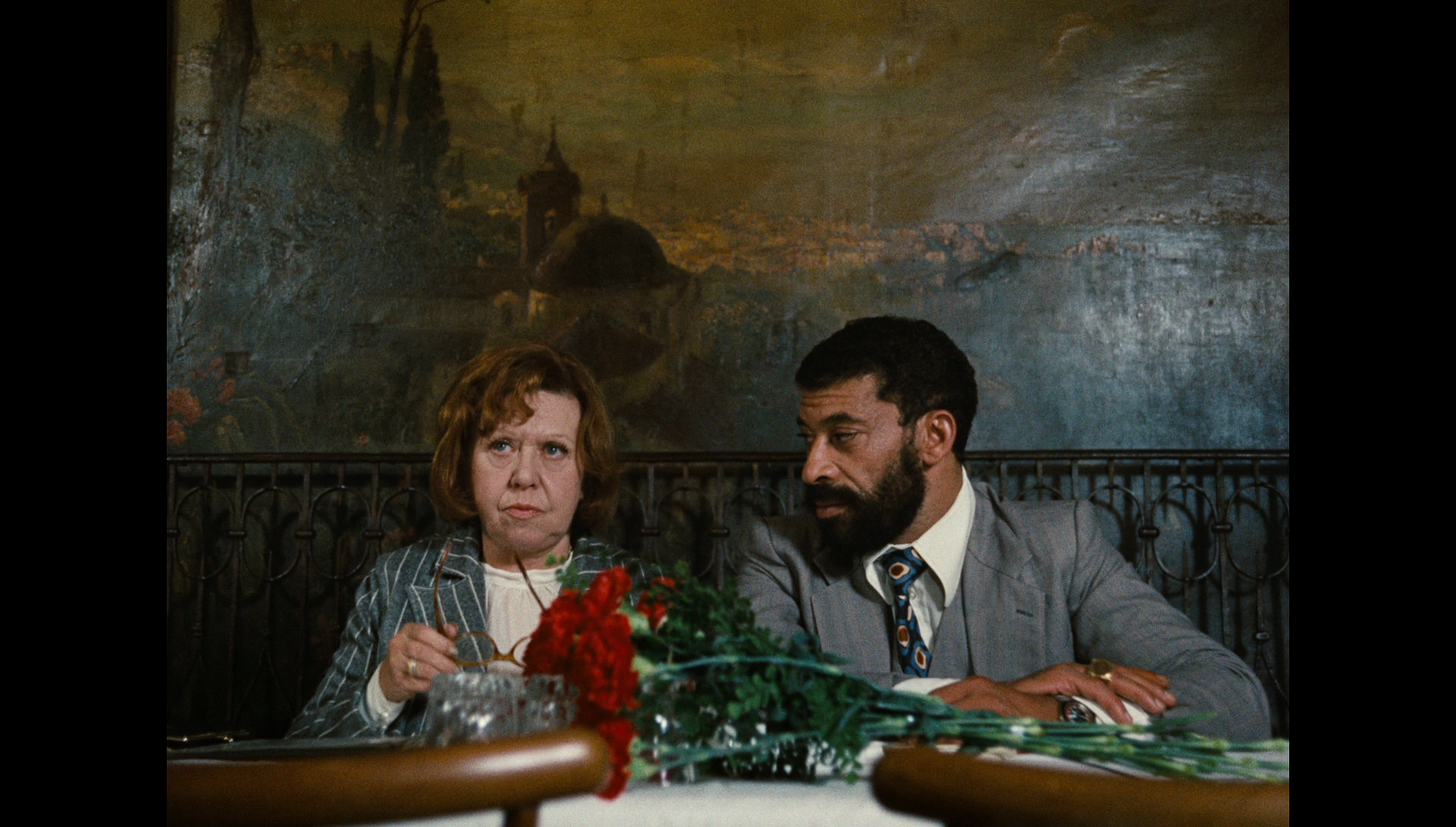 In a phenomenon that, a few years later, would be detailed thoroughly in Edward Said’s cornerstone text about Western society’s perceptions of ‘the East’, Orientalism (1978), Ali is objectified by the Germans he meets. They see him as an exotic ‘other’. He is also objectified by the gaze of the camera. (In fact, he is the only character who appears naked onscreen.) When we (and Emmi) meet Ali in the pub, it is clear that he’s ‘used’ by both the Barbara and a female ‘regular’ (Katharina Herberg) for sexual gratification. When Emmi enters the pub, we see the female customer ask Ali, ‘Are you coming or not?’; she presumably intends for Ali to return home with her. Ali refuses; the woman asks him why not’. ‘Cock broken’, Ali asserts unsubtly, in reference to the amount of alcohol he has had to drink. Later, after their return from holiday and Emmi’s apparent assimilation of the prejudices towards Ali, Emmi is as guilty as those around her of objectifying Ali, denying him his subjectivity. She invites her colleagues to her home and tells Ali to show the women his muscles. She puts Ali on display, allowing her coworkers to feel Ali’s biceps. Ali realises the extent to which he is being objectified and reacts badly, storming out of the flat. ‘What’s up with him?’, one of Emmi’s colleagues asks. ‘He has his moods’, Emmi suggests, ‘It’s his foreign mentality’. The dispute between Ali and Emmi comes to a head when Ali collapses owing to a ruptured stomach ulcer which a doctor in the hospital tells Emmi symbolically ‘happens a lot with foreign workers. It’s the stress’. Fassbinder ends the narrative with a Ali writing in pain, Emmi at his side. In a phenomenon that, a few years later, would be detailed thoroughly in Edward Said’s cornerstone text about Western society’s perceptions of ‘the East’, Orientalism (1978), Ali is objectified by the Germans he meets. They see him as an exotic ‘other’. He is also objectified by the gaze of the camera. (In fact, he is the only character who appears naked onscreen.) When we (and Emmi) meet Ali in the pub, it is clear that he’s ‘used’ by both the Barbara and a female ‘regular’ (Katharina Herberg) for sexual gratification. When Emmi enters the pub, we see the female customer ask Ali, ‘Are you coming or not?’; she presumably intends for Ali to return home with her. Ali refuses; the woman asks him why not’. ‘Cock broken’, Ali asserts unsubtly, in reference to the amount of alcohol he has had to drink. Later, after their return from holiday and Emmi’s apparent assimilation of the prejudices towards Ali, Emmi is as guilty as those around her of objectifying Ali, denying him his subjectivity. She invites her colleagues to her home and tells Ali to show the women his muscles. She puts Ali on display, allowing her coworkers to feel Ali’s biceps. Ali realises the extent to which he is being objectified and reacts badly, storming out of the flat. ‘What’s up with him?’, one of Emmi’s colleagues asks. ‘He has his moods’, Emmi suggests, ‘It’s his foreign mentality’. The dispute between Ali and Emmi comes to a head when Ali collapses owing to a ruptured stomach ulcer which a doctor in the hospital tells Emmi symbolically ‘happens a lot with foreign workers. It’s the stress’. Fassbinder ends the narrative with a Ali writing in pain, Emmi at his side.
As Vera Dika notes, Fassbinder’s films marry the intellectual project of Fassbinder’s background in Brechtian theatre and the attempts to ‘make his audience think’ with the qualities of Douglas Sirk’s melodramas and a desire to encourage the viewers of his films to feel too (Dika, 2012: 216). Certainly, this method is present within Fear Eats the Soul, the picture marrying the emotional and dramatic content of a Sirk film with an engaging and thought-provoking examination of prejudice.
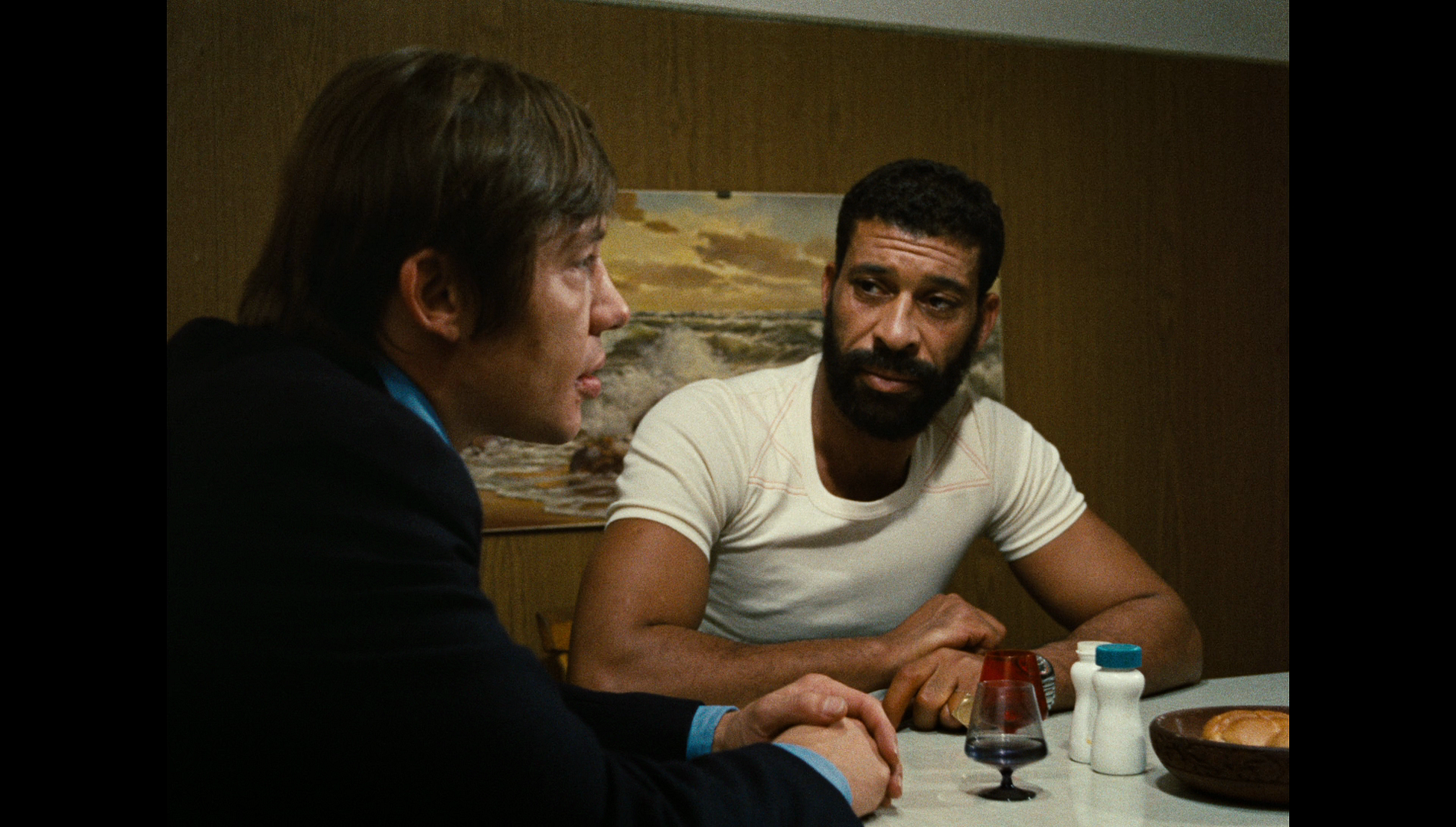 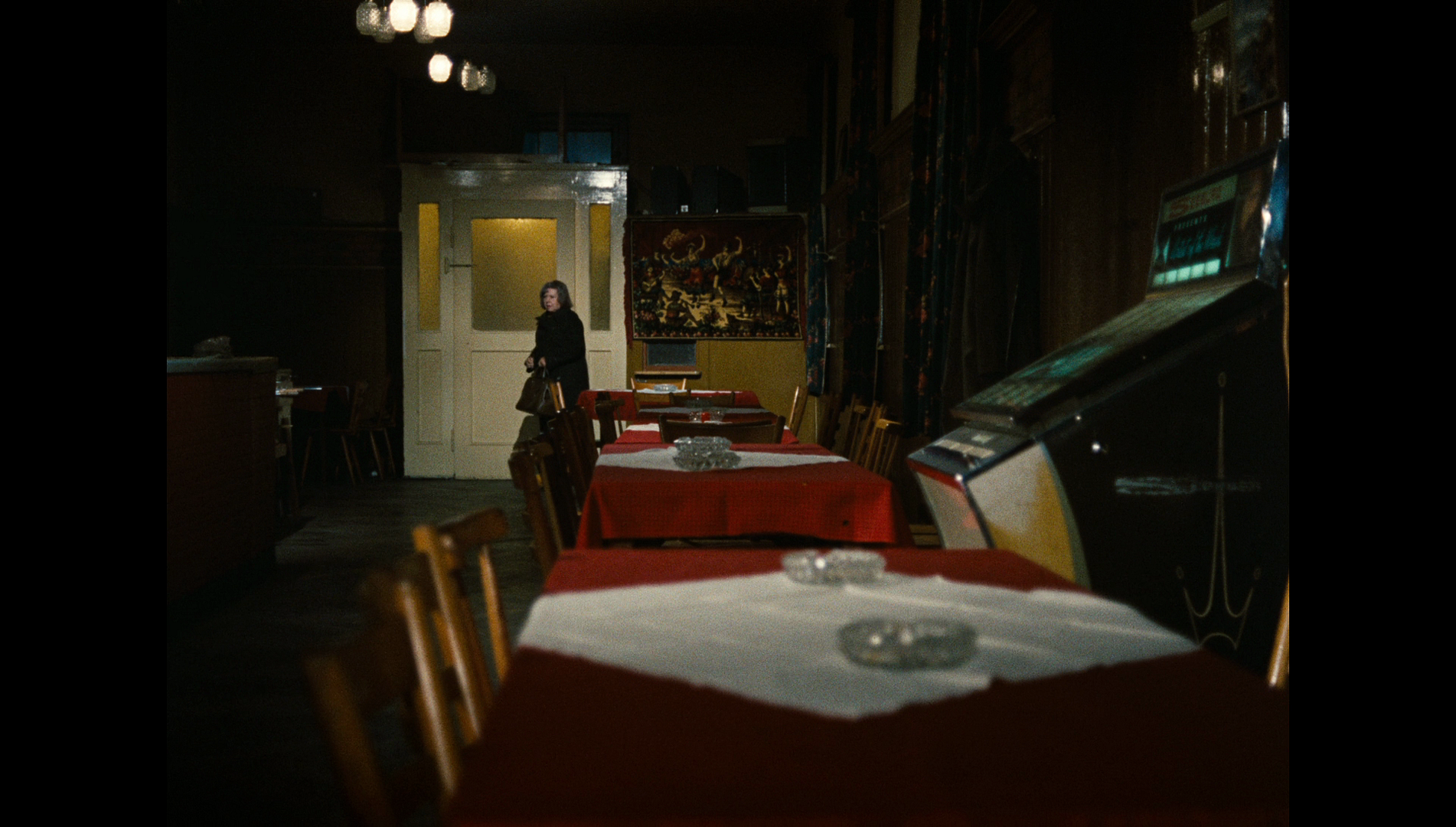 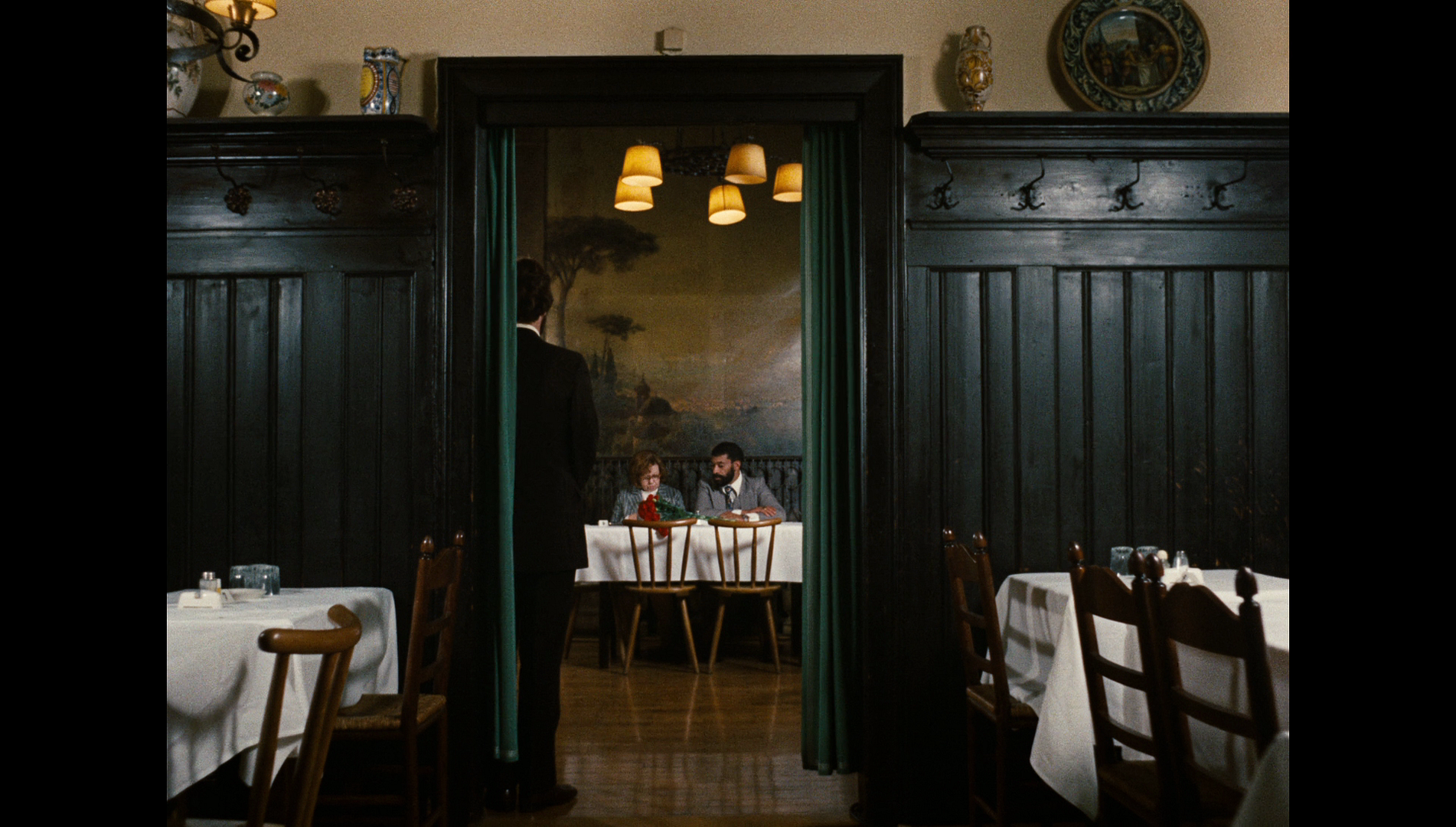
Video
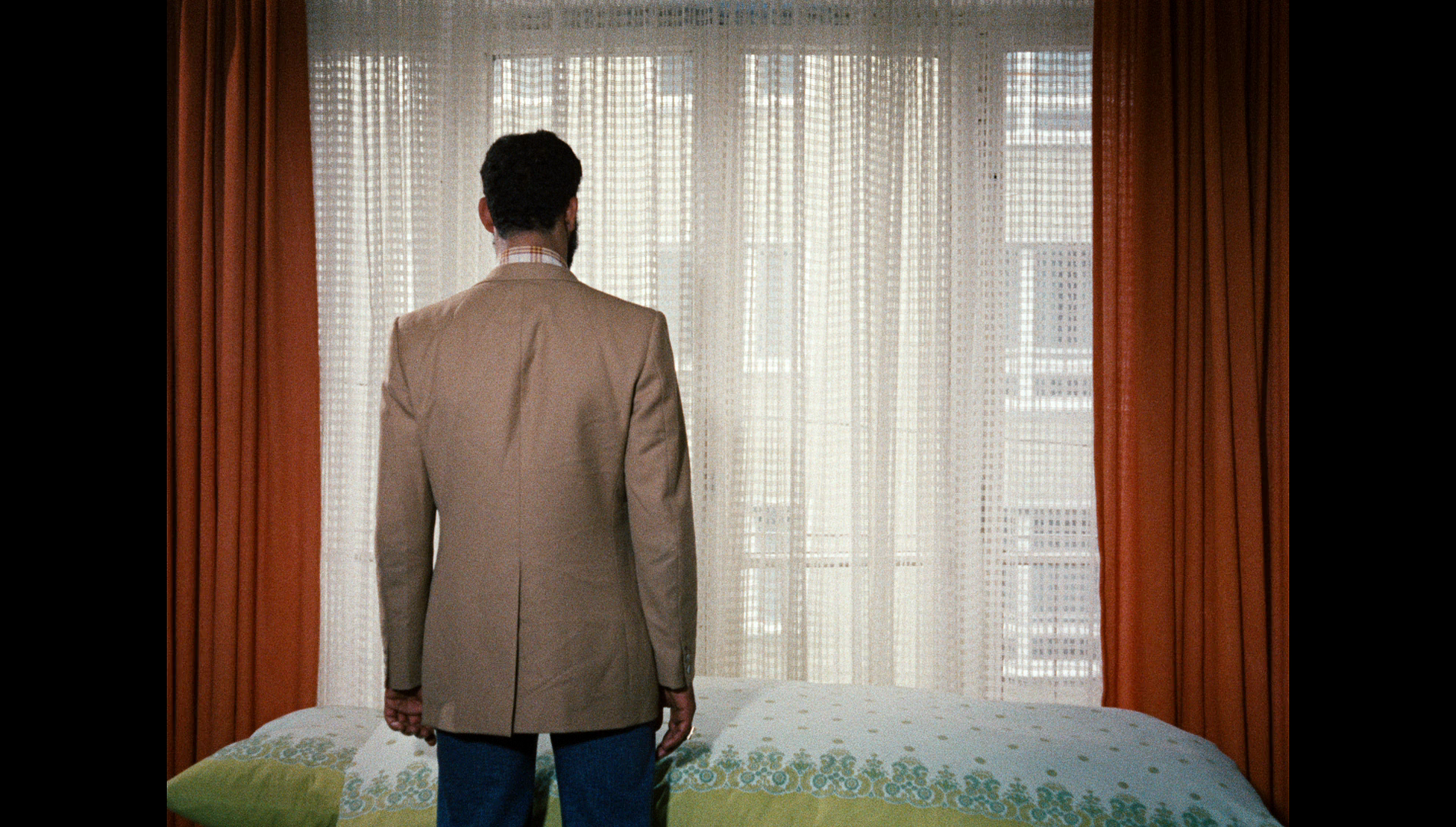 Presented uncut and with a running time of 92:58 mins, the film is in the 1.37:1 aspect ratio. The 1080p presentation takes up 27Gb of space on the disc and, using the AVC codec, is based on a new 4k restoration. Detail is staggering, in comparison with the film’s previous home video releases. Many of the shots are staged in depth; frequently, the compositions find Ali and/or Emmi framed within doorways, the use of the frame-with-a-frame adding a sense of depth to the image (carried by a strong depth of field) and symbolising the isolation and entrapment of the characters whilst also acting as a Brechtian device, distancing the viewer from the drama. Colours are reproduced in a rich, naturalistic fashion with a strong sense of consistency. Contrast levels are very good too, with a strong balance of light and dark and very well-defined mid-tones: it’s a darker and more ‘contrasty’ presentation of the film than that found on the previous DVD releases, but feels more film-like because of it. Finally, a strong encode ensures the presentation retains the structure of 35mm film. Presented uncut and with a running time of 92:58 mins, the film is in the 1.37:1 aspect ratio. The 1080p presentation takes up 27Gb of space on the disc and, using the AVC codec, is based on a new 4k restoration. Detail is staggering, in comparison with the film’s previous home video releases. Many of the shots are staged in depth; frequently, the compositions find Ali and/or Emmi framed within doorways, the use of the frame-with-a-frame adding a sense of depth to the image (carried by a strong depth of field) and symbolising the isolation and entrapment of the characters whilst also acting as a Brechtian device, distancing the viewer from the drama. Colours are reproduced in a rich, naturalistic fashion with a strong sense of consistency. Contrast levels are very good too, with a strong balance of light and dark and very well-defined mid-tones: it’s a darker and more ‘contrasty’ presentation of the film than that found on the previous DVD releases, but feels more film-like because of it. Finally, a strong encode ensures the presentation retains the structure of 35mm film.
Audio
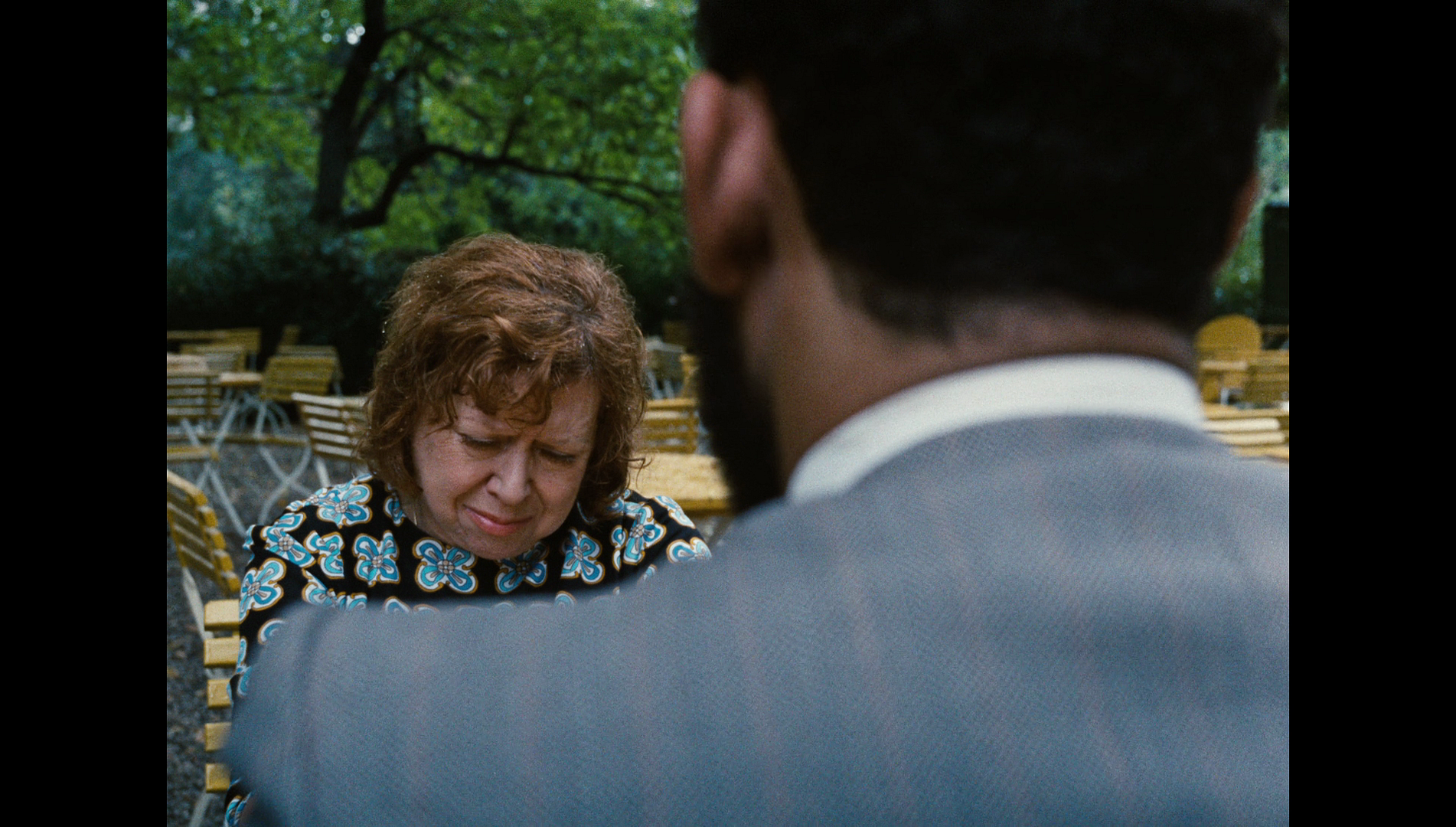
>Audio is presented in German via a LPCM 2.0 mono track, with optional English subtitles. The audio track is clean and clear, with a pronounced sense of range to it. Subtitles are clear and easy to read, and attempt the difficult task of translating Ali's broken German into equally broken English.
Extras
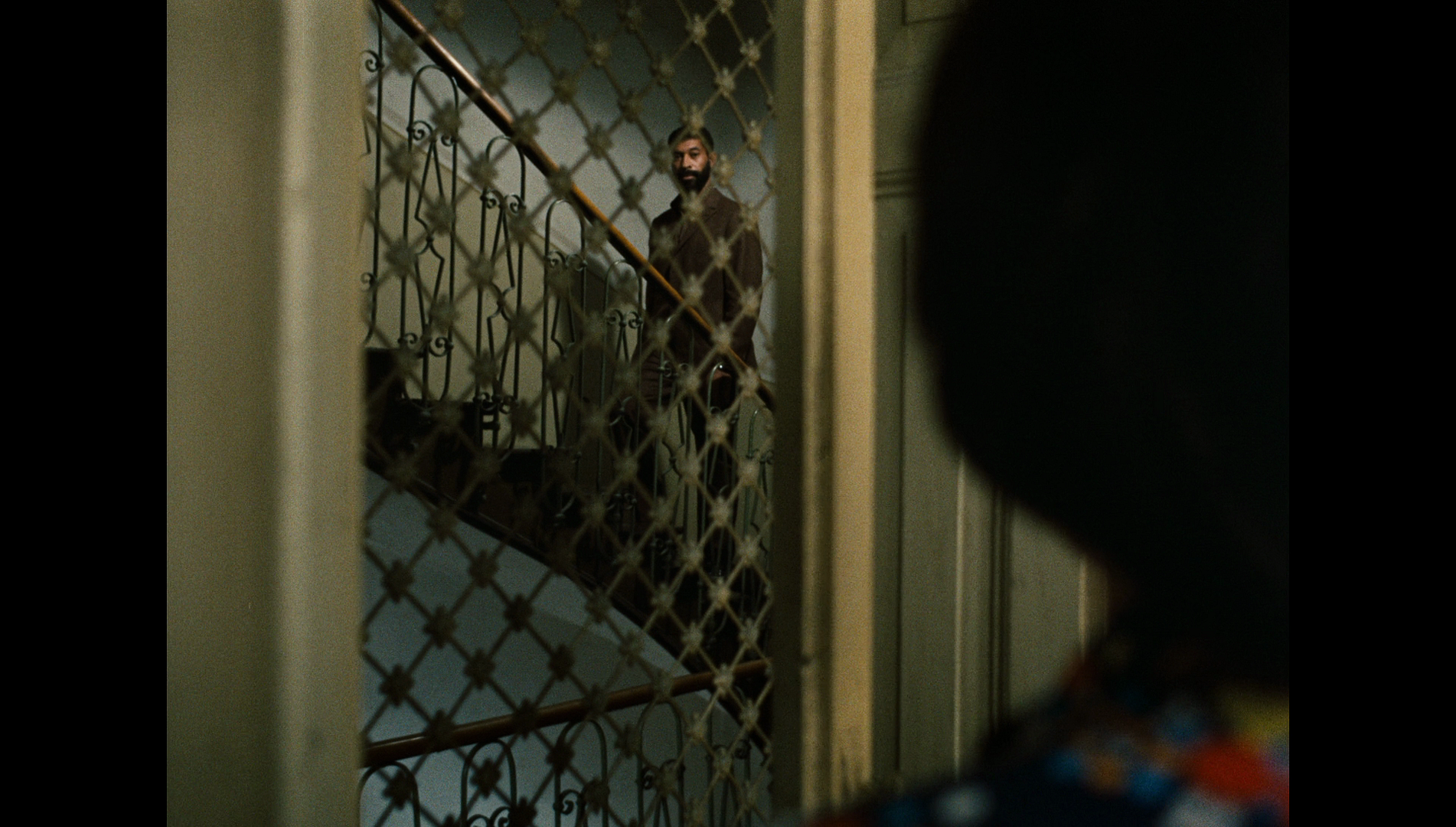 - Audio commentary with Mark Freeman. Freeman, who teaches at Swinburne University, discusses the film with a strong sense of enthusiasm and a clear engagement with its themes. Freeman shows a keen eye for detail in his discussion of specific techniques and aspects of performance and photography within the film. - Audio commentary with Mark Freeman. Freeman, who teaches at Swinburne University, discusses the film with a strong sense of enthusiasm and a clear engagement with its themes. Freeman shows a keen eye for detail in his discussion of specific techniques and aspects of performance and photography within the film.
- ‘My Name is Not Ali’ (96:33). Made in 2011, this documentary directed by Viola Shafik focuses on Mohamed El-Hedi Ben Salem, the Moroccan actor who plays Ali in Fear Eats the Soul and appeared in a number of Fassbinder’s other films before his much too-early death at the age of 41 in 1976. The documentary features footage from the films intercut with interviews with Salem’s costars and members of the Fassbinder’s ‘group’ before moving to Tangiers, where Salem’s family are interviewed and the story of Salem’s sons is told. It’s an interesting documentary, and by the end of it Salem remains as much of an enigma as ever.
- Interview with Jurgen Jurges (10:42). In this new interview with the cinematographer of Fear Eats the Soul, Jurges talks about the origins of the film. He talks about the lighting for the picture in some detail, and discusses Fassbinder’s liking of the work of Douglas Sirk and the director’s approach to directing. Jurges speaks in German, with accompanying optional English subtitles.
- Trailer (3:12).
Overall
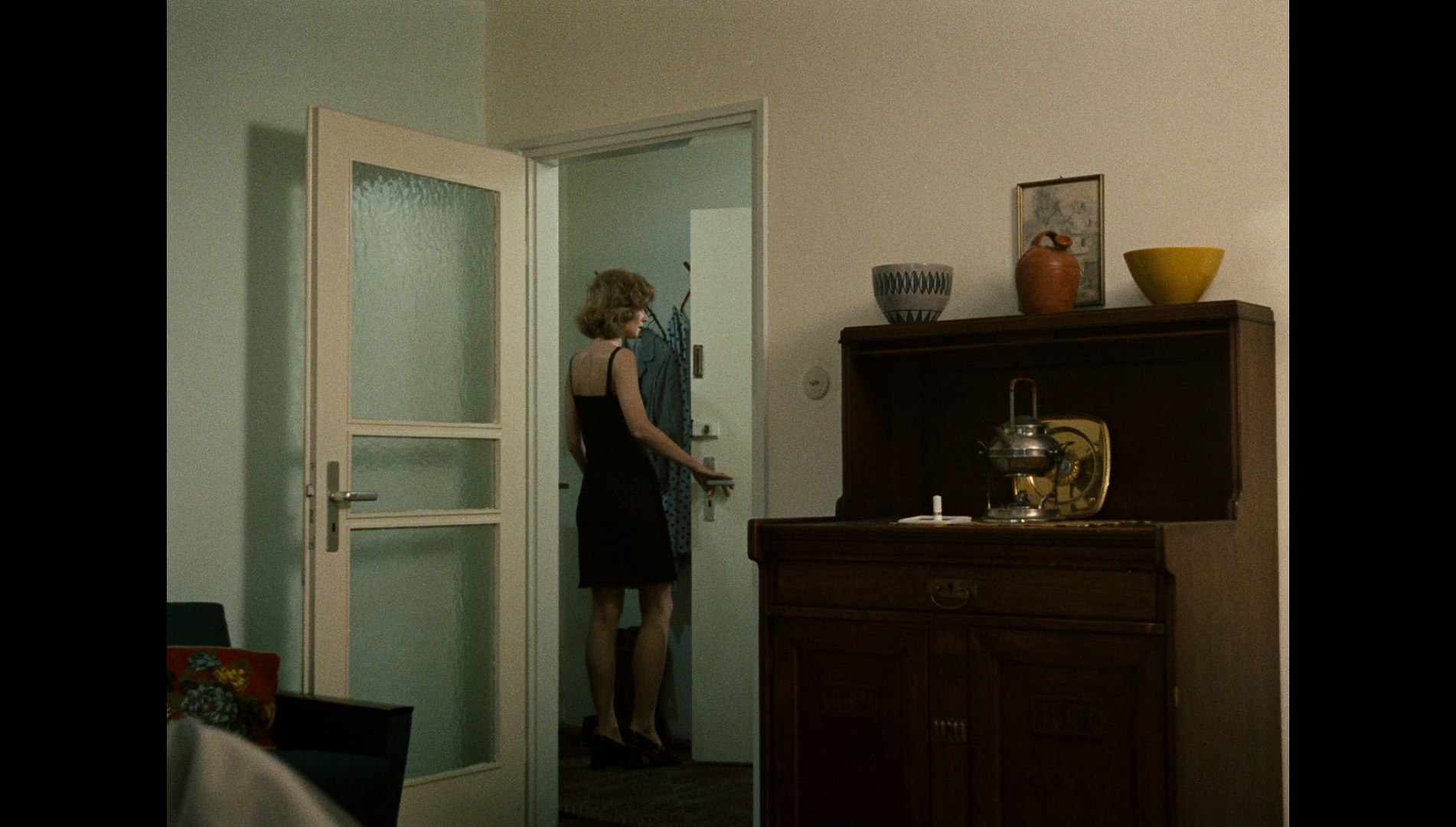 Every Fassbinder film is a treat, and from his remarkable filmography it’s exceptionally difficult to choose a favourite. (The fact that Fassbinder, who died at the young age of 37, made so many remarkable films in such a short life is incredible.) Nevertheless, Fear Eats the Soul is one of Fassbinder’s most well-known films for a reason. As suggested above, the picture marries many of the defining elements of Fassbinder’s films: his love of melodrama, his intellectual engagement, and his background in Brechtian theatre. It’s an extraordinary film about prejudice, loneliness and relationships that still feels utterly relevant for today. Arrow’s presentation of the film is very good, and the film is accompanied by some excellent contextual material – especially the interview with Jurges. Every Fassbinder film is a treat, and from his remarkable filmography it’s exceptionally difficult to choose a favourite. (The fact that Fassbinder, who died at the young age of 37, made so many remarkable films in such a short life is incredible.) Nevertheless, Fear Eats the Soul is one of Fassbinder’s most well-known films for a reason. As suggested above, the picture marries many of the defining elements of Fassbinder’s films: his love of melodrama, his intellectual engagement, and his background in Brechtian theatre. It’s an extraordinary film about prejudice, loneliness and relationships that still feels utterly relevant for today. Arrow’s presentation of the film is very good, and the film is accompanied by some excellent contextual material – especially the interview with Jurges.
References:
Dika, Vera, 2012: ‘Between Nostalgia and Regret: Strategies of Historical Disruption from Douglas Sirk to Mad Men’. In: Smyth, J E (ed), 2012: Hollywood and the American Historical Film. London: Palgrave Macmillan: 208-33
Wicks, James, 2014: Transnational Representations: The State of Taiwan in the 1960s and 1970s. Hong Kong University Press
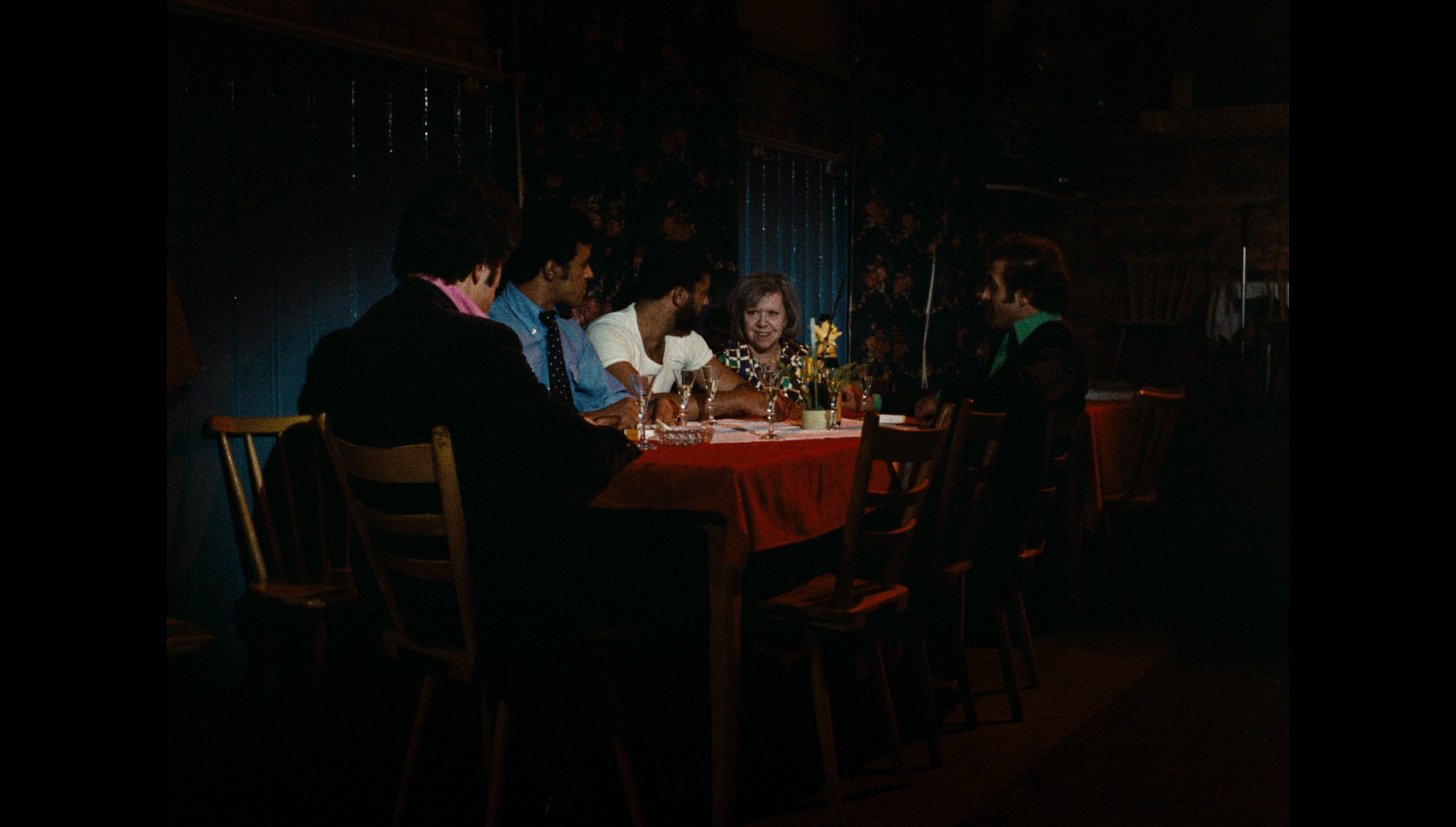
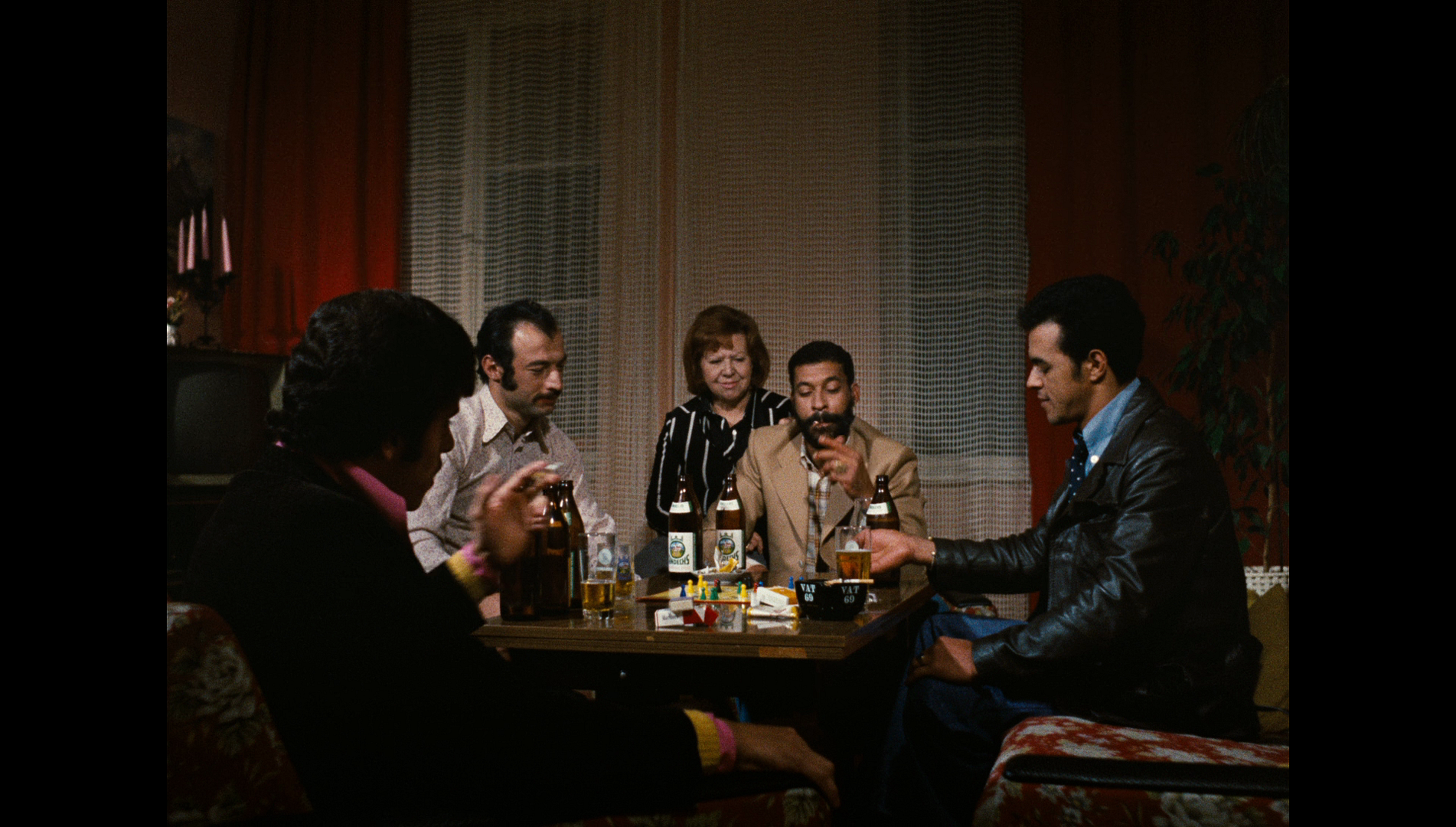
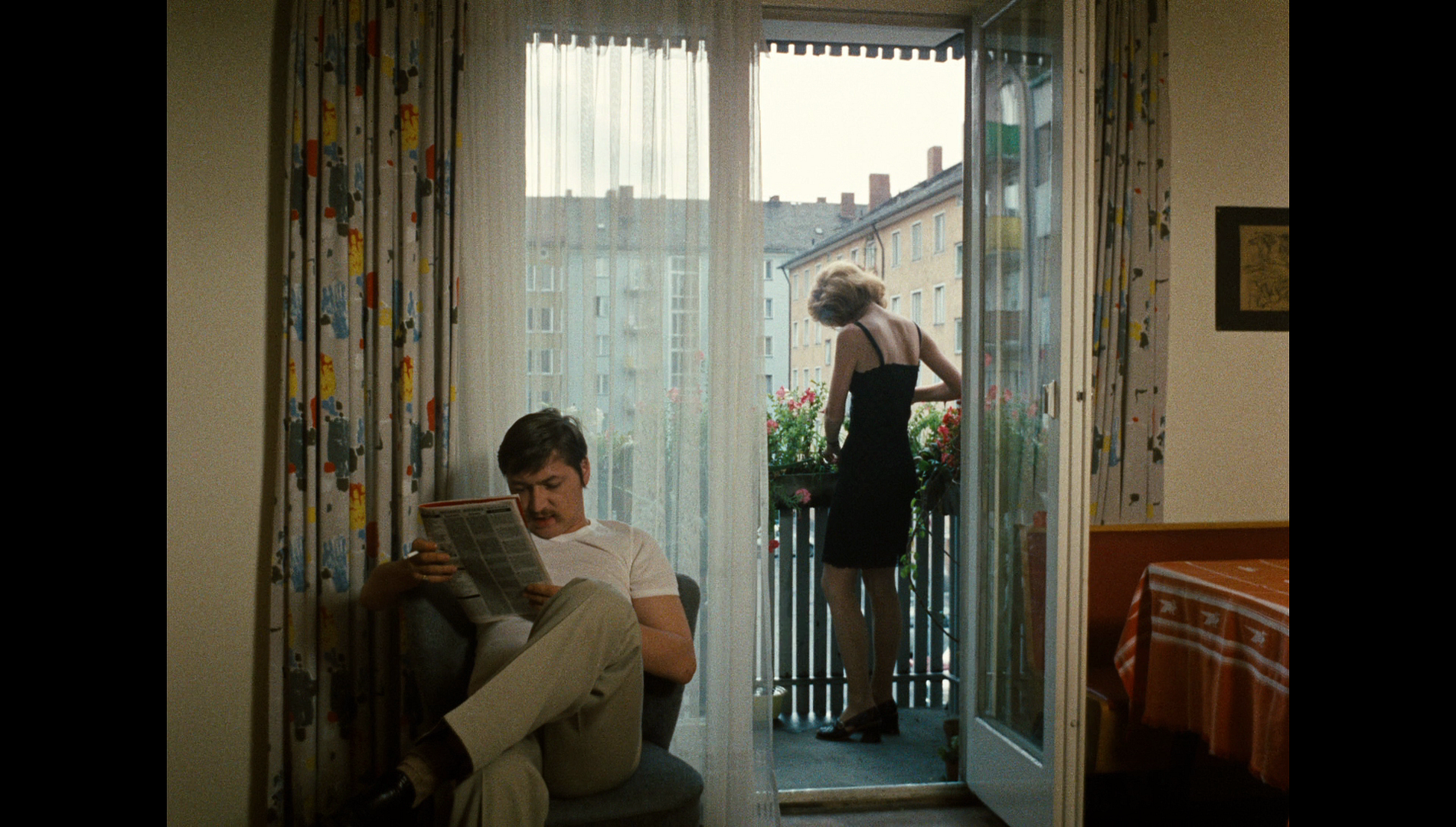
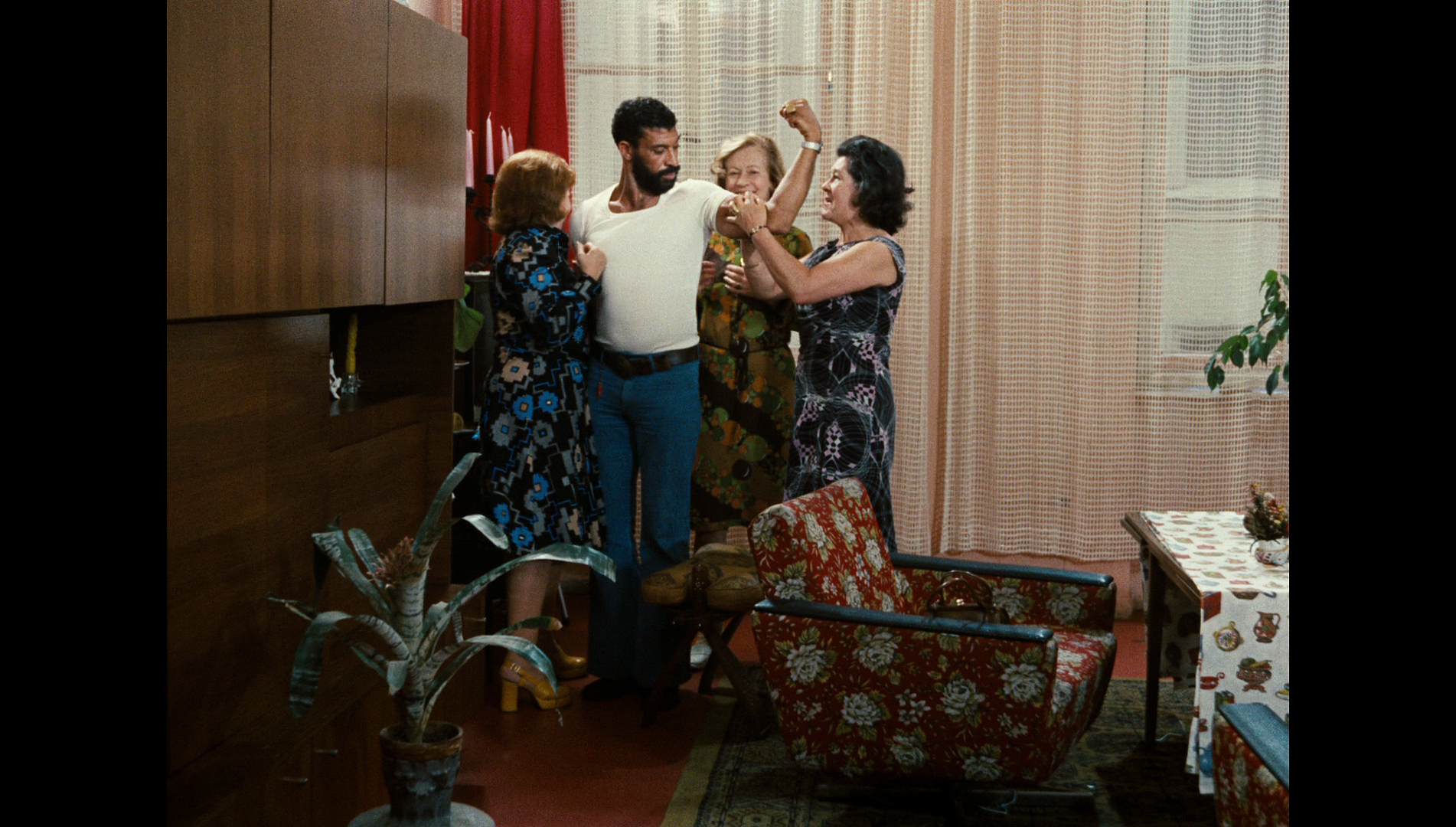
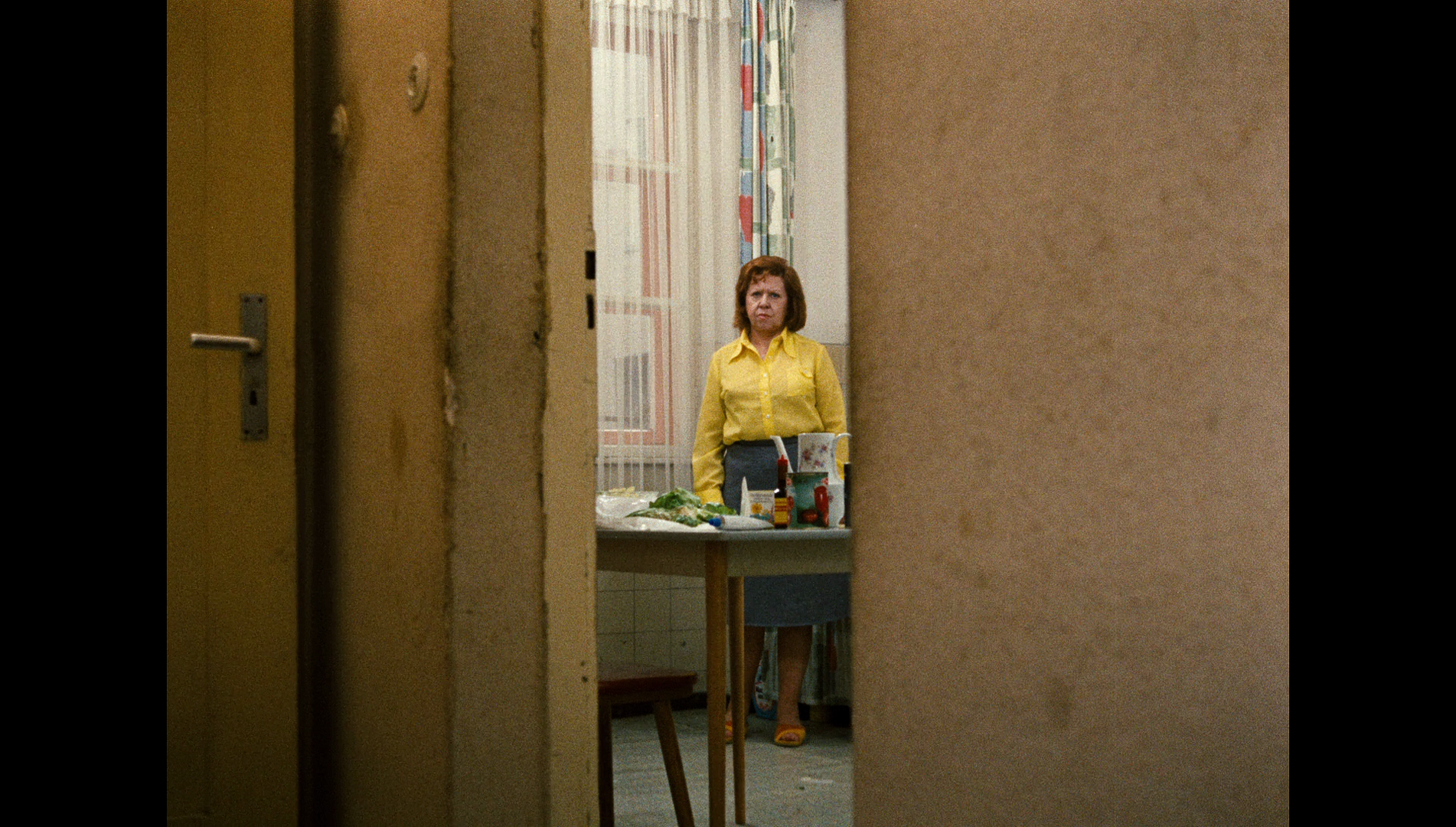
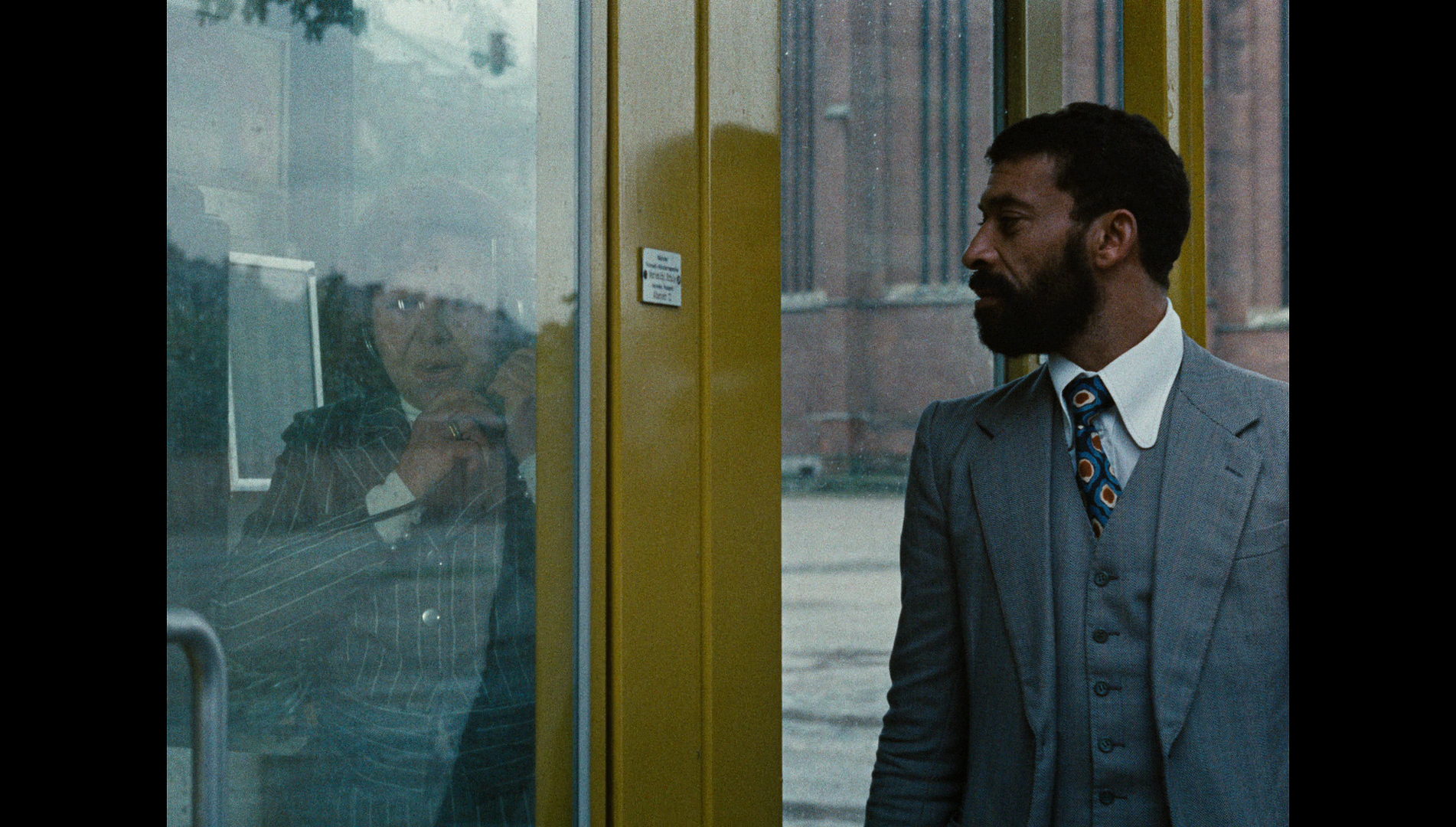 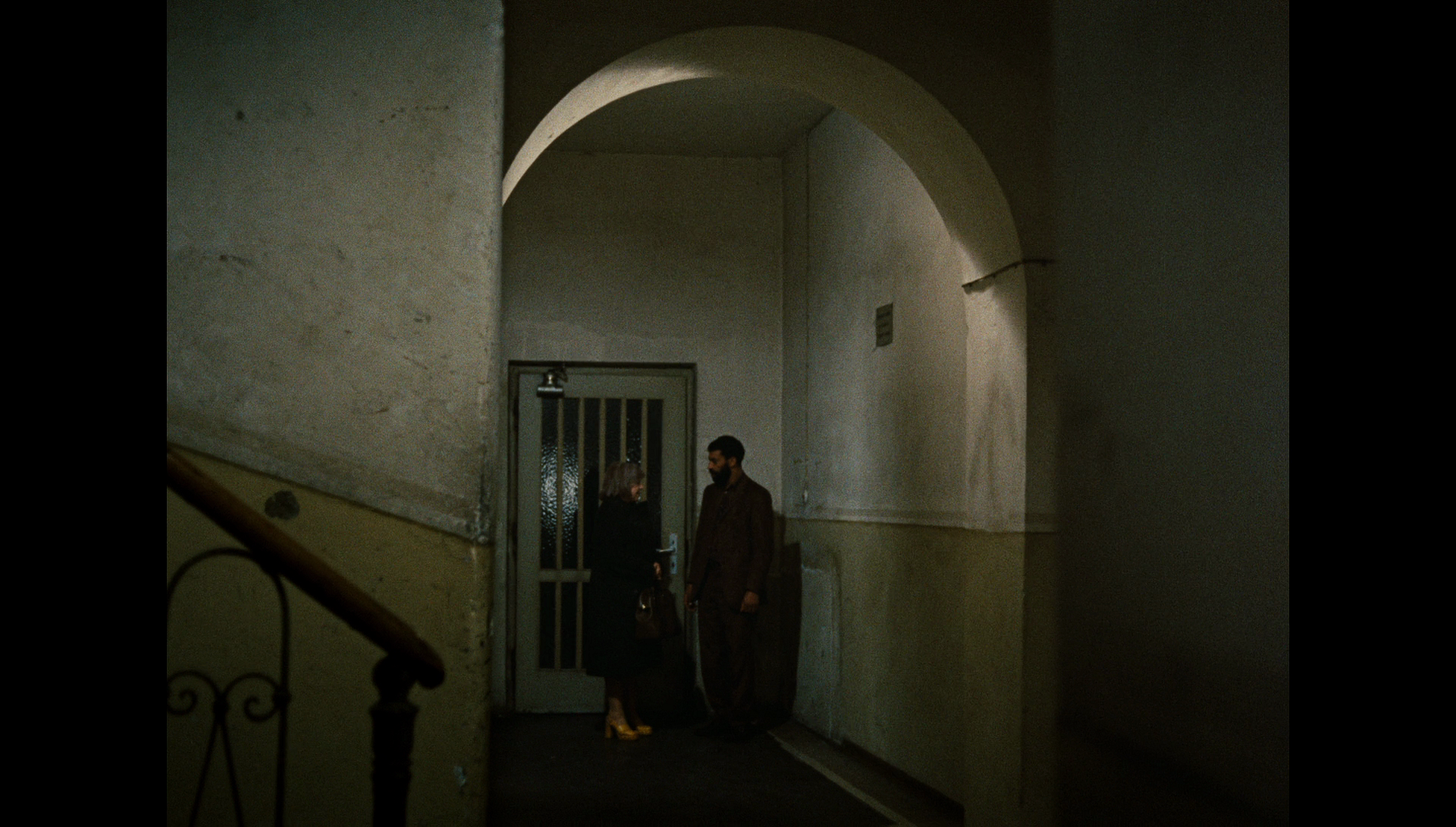
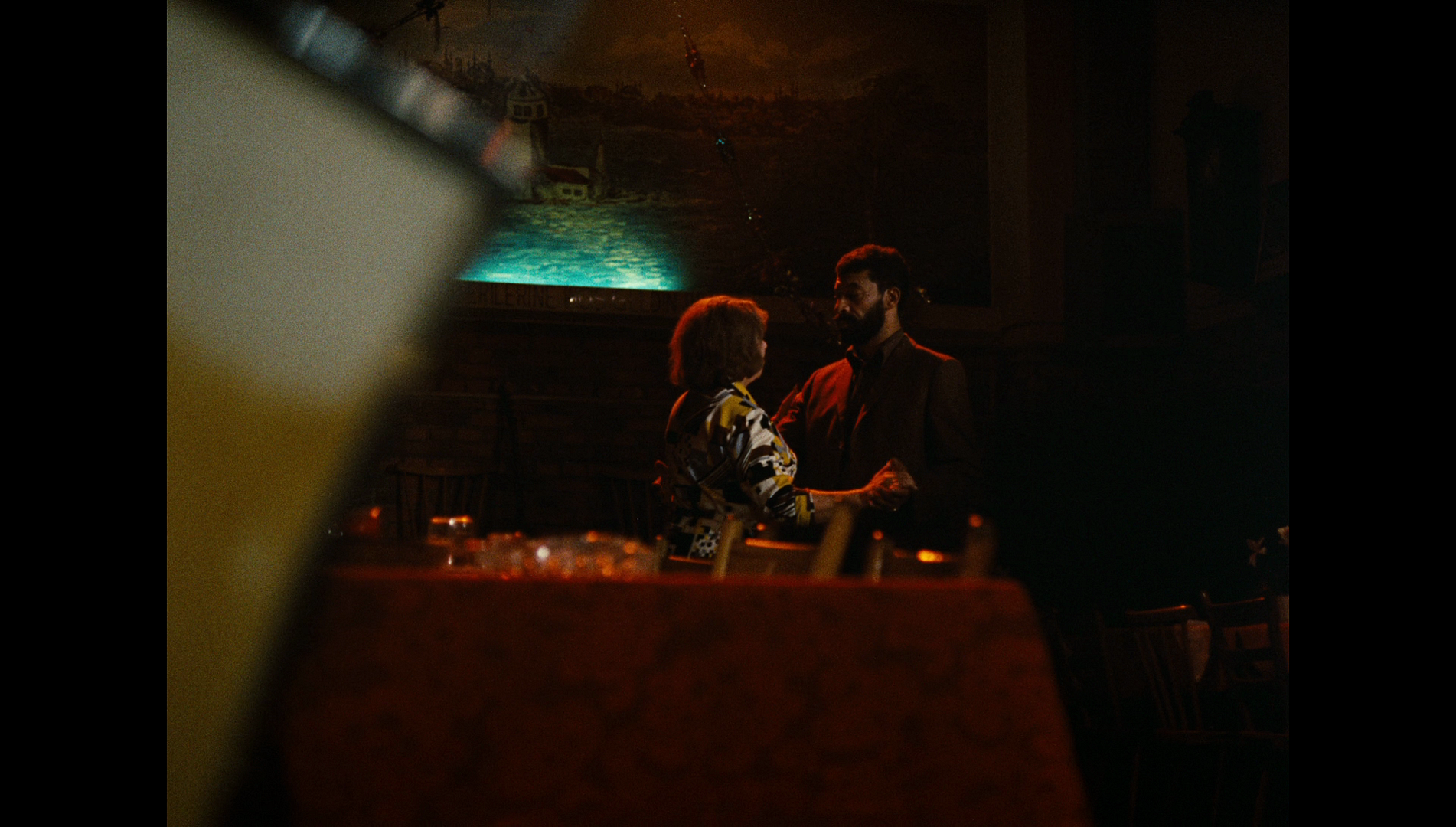
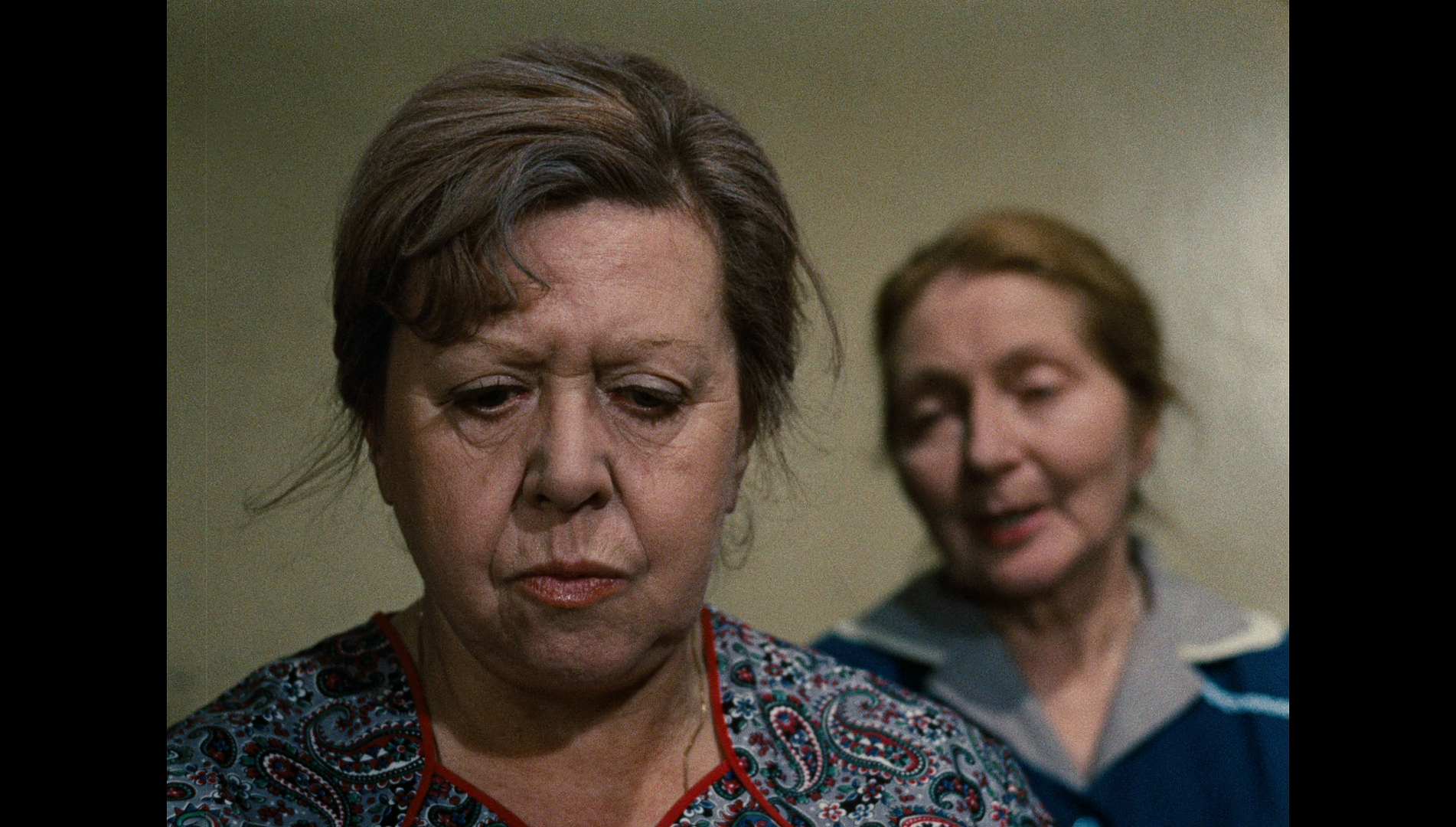
|


